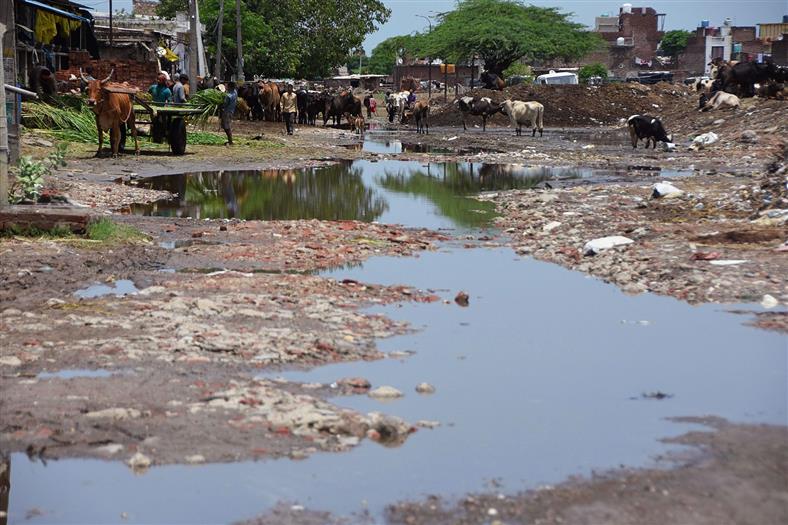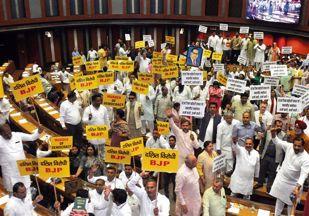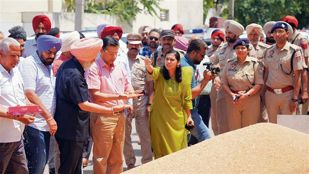
The situation demands that the authorities concerned must start preparing to manage both problems. tribune photo: Himanshu Mahajan
Open House Is Health Dept prepared for monsoon-related diseases amid Covid-19 pandemic?
Amid Covid-19 pandemic, controlling vector-borne diseases has become increasingly important. The monsoon has hit northern India. As usual, there will be cases of dengue fever, chikungunya and leptospirosis during the rainy season. The state government has to put up a new plan to tackle these diseases while battling the coronavirus pandemic.
Nidhi Kumari
Prepare beforehand, segregate patients
The health measures in the wake of Covid-19 pandemic will face a tough challenge once the monsoon arrives. The rainy season brings with itself a set of diseases each year affecting the young and old alike. Already due to the pandemic, the healthcare workers are putting in extra hours to tackle the situation. Facilities at hospitals have been upgraded in view of the pandemic and segregation of patients was being done at each level. Once the monsoon arrive, it will be difficult for the Health Department to deal with the situation if they aren't well-prepared to handle the challenges ahead. In order to avoid any last minute chaos proper provisions must be made. Wards must be separated for patients suffering from malaria, dengue etc. It is important to consider that many of such diseases have Covid-like symptoms hence utmost care must be taken in order to segregate the patients. Proper testing is needed so that no cases are mixed up amongst one another. Healthcare workers need to be extra cautious while working with patients and treating them. The Health Department must act quickly and make necessary arrangements so that the public can get proper health facilities in segregated zones for Covid and water-borne diseases.
Simran Kaur
Keep surroundings clean
Every year we face the same set of problems of water logging and water accumulation during monsoon. These inundated roads become breeding ground for mosquitoes. The tall claims made by the local government regarding monsoon preparedness fall flat once the rainy season begins. This time we are facing a dual problem as the fear of Covid -19 looms large. After rain we have to suffer with various types of diseases such as, dengue, chikungunya, malaria and swine flu etc. It is the duty of the local and state governments to implement various policies to eradicate diseases from the nation. It depends upon the will and vision of the government to keep its citizens healthy and fit. The other duty rests on the shoulders of citizens, that we should keep our periphery and environment clean and motivate others to do the same. Those who are not following the directions and instructions of the experts must be punished. Rules should be adhered strictly. It is said that prevention is better than cure so to keep vector-borne diseases at bay one should wear proper clothes and use mosquito-repellent creams. Surroundings must be cleaned and water should not be allowed to accumulate at home. Change the water in room coolers once in a week. The government should make maximum use of electronic and print media to make people aware of these diseases, their causes, symptoms and remedies only with the help of experts. Special programmes should be initiated in schools and colleges to spread awareness both about coronavirus and other mosoon-related diseases. Public should support and cooperate with the government and their fellow citizens to eradicate vector-borne and other diseases and must also wear masks and wash their hands with soap. They must also keep social distance when they are in public places.
Dr Mohd Saleem Farooqui
Carry out inspection of manholes in city
Every year we have to face the problem of water accumulation in various colonies and areas. Various diseases such as chikungunya, dengue and malaria claim many lives but this time we have to fight the battle on another front as Covid-19 cases in the city have crossed 1,000 mark and the cases are rising day by day. Under these circumstances, the local government must devise a policy which may meet this double challenge and citizens must support the local government by keeping their surroundings neat and clean. Wash their water coolers and make it sure that there should not be any accumulation of water. The local government must also ensure that sewerage or rain water doesn't get mixed with potable water. The government has also started a drive to prepare the banks of Buddha Nullah so that water may not enter into any locality. Similarly, proper inspection should be carried out of manholes and other potholes on any road to avoid any accident during rain. Various signboards must be fixed where the road is not in good condition so that one may be cautious. We as a good citizen must cooperate with the local and state government during these hours when the coronavirus threat is a very big one for all of us.
Farzana Khan
Boost immunity against diseases
According to me, the Health Department is not at all ready to handle the monsoon-related diseases along with the Covid-19 pandemic. Forget about other diseases, the department is not taking care of Covid-19 patients. That's why serious patients are being referred to the other centers. The condition of regular patients is also deplorable. They are either fail to get treatment or are advised to return back home. Moreover, getting admitted in hospitals is also not safe as one can catch infection from Covid-19 patients. We as responsible citizens have to be vigilant and bring changes in our lifestyle so that at least we can boost our immunity against the monsoon-related diseases.
Bir Devinder Singh Bedi
Develop emergency operating centre models
In order to enhance public health preparedness and response capacity to handle the pandemic, the authorities concerned must focus on innovations, experience, training exercises, a coordinated and rapid investigation, national plans and overall preparedness capacity, risk communication, linking policy and implementation, interoperability between the health and non-health sectors to identify weaknesses in the system. There is also a dearth of proper management to handle the pandemic so that the health and economic impact of the disease can be minimised. Preparedness, which comprises activities that have to be undertaken to respond effectively before a disease outbreaks, is a subset of epidemic or pandemic management. The focus should be on to develop an EOC (Emergency Operating Center) model as it has proven to be an efficient preparedness framework for the control of a disease outbreak.
Ravi Chander Garg
Appoint more doctors, earmark additional funds
The Health Department has many pending issues in handling Covid-19 pandemic. The required number of places for quarantine of patients coming in from outside and the needed facilities for isolation of the indoor corona infected patients are still absent. Further, the number and details of state-owned hospitals and the number of total beds required for Covid-19 positive cases in different locations are still to be ear-marked and strengthened. There is also a strong need for strengthening Covid testing facilities. Now, monsoon is approaching fast and it will bring an additional burden of diseases. This will add to the responsibilities of the Health Department to handle different type of diseases simultaneously amid Covid-19. The department must gear up and develop the required facilities such as earmarking hospitals and dispensaries, appointing doctors and related paramedical staff. The state government must earmark additional funds to develop those minimum required facilities. Many jobs of doctors and other related staff are lying vacant. They must be filled up before the monsoon sets in. Each hospital must have stock of required medicines especially needed for summer diseases. The Municipal Corporation must play its role in maintaining cleanliness around the city. Additional garbage removal and mosquitoes control arrangements must be made. The local staff of the health department must start educating the people about the diseases likely to come and facilities available so that the people suffering from those diseases may make use of those facilities. Local press, social media and other modes must be used to do this.
Gautam Dev
Ensure proper drainage
Even as it is familiar to everybody that monsoon comes every year and causes demolition but this matter is given a very little concern. This also creates chaos in our lives due to water-logging on roads. The accumulated water because of bad drainage system leads to the breeding of mosquitoes, which spread diseases such as dengue, malaria, etc. The Health Department along with the Municipal Corporation should work for the betterment of drainage system in the city. They should also promote rainwater harvesting, which helps to utilise rain in a useful manner. According to researchers, the spread of Covid-19 would be at its peak in the monsoon due to high humidity level in the air. So, the administration in company with the community should be vigilant and should work together sincerely for the well being of humankind.
Harkirat Singh Shankar
Promote regular health check-ups
Monsoon brings with it many vector-borne diseases such as diarrhoea, malaria and dengue. As we have a proper medical treatment and diagnosis procedure to handle these, it won't be much of a concern. But the complication lies in the fact that we are already battling with Covid-19 for which no vaccine has been developed yet. The symptoms of normal flu and Covid-19 are the same. Hence, it becomes a real challenge for the authorities concerned to differentiate between these. People need to be aware of these at individual levels. The humidity in climate leads to various respiratory diseases further adding to the already existing viral infection. The present situation calls for combined efforts from citizens and departments both. Regular health check-ups should be promoted. Apart from the government and health departments the local citizens also need to perform their duties well to fight against the situation.
Ishita Katyal
Cooperate with dept
The monsoon has reached northern parts of India. Now, the question arises that the Health Department is prepared to handle monsoon diseases? The department is efficiently dealing with coronavirus and people are also taking necessary precautions. With the outbreak of pandemic, the hospitals are taking necessary precautions and have all equipments such as ventilator etc. But the MC’s sewer systems are not prepared to handle the rain. The stagnant water leads to rise in water-borne diseases. So, the Municipal Corporation has need to do some efforts otherwise there would be more pressure on Health Department.
Sukhman Singh
Monitor containment zones
Restaurants, bars, pubs, food joints in posh areas of various cities must follow the SoPs directed by the local government. Local markets must follow social distancing norms. Lockdown must be imposed considering the Covid-19 cases count in that area and containment zones must be closely monitored. People should stay at home and relish their long break from monotonous routine.
Palak sharma
Raise awareness about diseases
Fear of vector-borne diseases such as malaria, dengue and chikungunya amid the Covid-19 crisis will pose a tough challenge to the Heath Department. The state government has to make a new plan to tackle these diseases while battling the coronavirus pandemic. The Health Department should aware among the masses to keep themselves protected from all these diseases. In every hospital or clinic, doctors should raise awareness among patients about vector-borne diseases and measures to control these.
Sanjana
Be ready with backup plans
As the world is grappling with Covid-19 pandemic and the arrival of monsoon and diseases associated with it is going to increase the pressure on the Health Department. Though it's to tackle the situation but not impossible. The Health Department should know about the stock of medicines. The government should be ready with all backup plans. Hospitals should have different wards for Covid patients and other ones. Instant hospitalisation can simply be a good solution.
Harleen Kaur
Learn from foreign countries
The government has taken all necessary for the prevention Covid-19. Officials have urged residents to remain alert, meticulous, and conscious. We know that in monsoon many diseases such as malaria, dengue etc crop up. But this year the Covid-19 pandemic has worsened the situation. The government has urged the public to follow Covid-19 guidelines strictly. There was a need to learn from other countries in terms of handling the situation. We should stay at home, especially during monsoon and follow the safety measures.
Jagdeep Singh
Tough challenge ahead amid pandemic
Strictly speaking, the Health Department is not prepared to handle monsoon-related diseases along with the prevailing Covid-19 pandemic. During the monsoon season, most of the roads of the city get flooded with water. Every year, the city faces trouble due to waterlogging, especially at the old city areas and the outskirts. Under the Smart City Mission, storm drains were intended to be installed but they haven't been installed till now. As soon as the rainy season begins, water and vector-borne diseases will start to spread. Water-borne diseases such as diarrhoea and jaundice may complicate the situation. Since the pandemic has been taking its roots in the city, spread of water-borne diseases will lead to increased burden on the Health Department as well as on the people. The approach to solve the problem should be rational. First of all, the Civic Department must be roped in to install the storm drains and prevent waterlogging in the potholes on the roads. The Health Department can involve social media activists to aware people about the spread of monsoon-related diseases. It must prepare itself for any rise in spread of the diseases and must keep protection kits ready. Spraying of disinfectants to curb the production of pathogens must be done. Everyone needs to join hands together in order to solve this problem.
Manmohan Kaur
Clean water bodies
As on date, the world sees no sign of escaping from coronavirus. But the Nature is moving in its own pace as monsoon has arrived in the city. Since the rainy season brings joy and delight for citizens and farmers, it also causes health problems that emanate from stagnant water. This year the challenge will be bigger than before amid Covid-19 pandemic. Considering the current situation, the Health Department has already swung into action to fight the menace. As we know Buddha dariya is a breeding ground for mosquitoes. Water flows out from boundaries of Buddha dariya and leading to accumulation of water on the roads. So, the administration as well as the Health Department should do something about it. Water pollution is also a big problem in the city. Rivers should be cleaned on priority to prevent the spread of water-borne diseases. Awareness should be spread among citizens regarding the matter.
Bhavya
Set up task force
The task force set up by the Maharashtra government to assist it in managing the coronavirus situation has asked the administration to gear up for non-Covid-19 diseases during the monsoon. Similar steps can be emulated in the city to handle the situation.
Priyankla Chawla
Health Dept not fully prepared right now
The foremost reason that an early lockdown was imposed nationwide was to gather and assemble the necessary medical equipments such as PPE kits, ventilators and required medicines. But gradually, the lockdown started to lift and we could observe the news about the unavailability of ventilators and other equipments. Even some doctors were not available or ready to treat the Covid-affected patients because of the risk it posed to them. Hospital beds are reserved for the 'privileged' ones. Some hospitals are not ready to admit patients other than Covid patients. Some of the medical officials, nurses or doctors are quitting their jobs at the time when nation needs them the most. Considering monsoon-related diseases, including dengue, malaria and cholera in my opinion the Health Department is not fully prepared to handle everything at once. Necessary steps must be taken to handle the situation. Doctors should be provided with adequate PPE kits. Required medical equipment should be imported to cater to the needs of patients and doctors.
Smriti Chaudhary
Join Whatsapp Channel of The Tribune for latest updates.



























